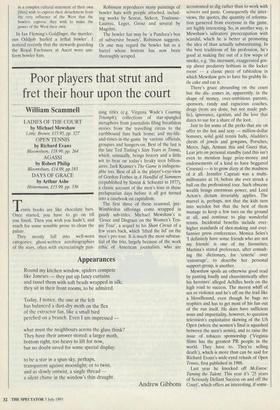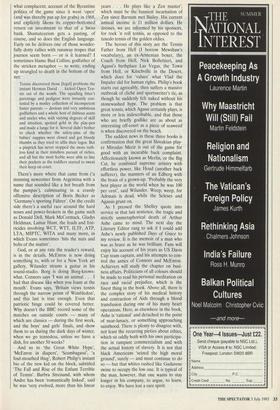Poor players that strut and fret their hour upon the
court
William Scammell
LADIES OF THE COURT by Michael Mewshaw Little, Brown, f I 5 95, pp. 327 OPEN TENNIS by Richard Evans Bloomsbury, f18 99, pp. 264 AGASSI by Robert Philip Bloomsbury, 1'14.99, pp.I83 DAYS OF GRACE by Arthur Ashe Heinemann, £15.99, pp. 336 Tennis books are like chocolate bars. Once started, you have to go on till you finish. Then you wish you hadn't, and reach for some sensible prose to clean the palate.
They mostly fall into well-worn categories: ghost-written autobiographies of the stars, often with excruciatingly pun-
ning titles (e.g. Virginia Wade's Courting Triumph); collections of star-spangled metaphors from journalists filing breathless stories from the travelling circus to the earthbound fans back home; and my-life- and-times-in-the-game by various officials, groupies and hangers-on. Best of the last is the late Ted Tinling's Sixty Years in Tennis, which, unusually, brings history and a little wit to bear on today's freaky teen billion- aires. Jack Kramer's The Game is indispens- able too. Best of all is the player's-eye-view of Gordon Forbes in A Handful of Summers (republished by Simon & Schuster in 1977), a classic account of the men's tour in those prelapsarian days before it all got turned into a casebook on capitalism.
The first three of these seasonal, pre- Wimbledon offerings come wrapped in gaudy sub-titles. Michael Mewshaw's is 'Grace and Disgrace on the Women's Ten- nis Tour', a sequel to his Short Circuit of a few years back, which 'lifted the lid' on the men's pro tour. It is much the most substan- tial of the trio, largely because of the work ethic of American journalists, who are
accustomed to dig rather than to work with scissors and paste. Consequently the inter- views, the quotes, the quantity of informa- tion garnered from everyone in the game, are highly interesting. So, in another way, is Mewshaw's salivatory preoccupation with scandal, which he is better at promoting the idea of than actually substantiating. In the best traditions of his profession, he's good at making fire out of a few wisps of smoke, e.g. 'the incessant, exaggerated gos- sip about predatory lesbians in the locker room' — a classic piece of tabloidese in which Mewshaw gets to have his grubby lit- tle cake and eat it.
There's grace abounding on the court but the dis- comes in, apparently, in the shape of money, over-ambitious parents, sponsors, randy and rapacious coaches, drugs (tests are done, but not made pub- lic), ignorance, egotism, and the love that dares to sue for a share of the loot.
Just to list some of the perks that are on offer to the hot and sexy — million-dollar bonuses, solid gold tennis balls, Aladdin's chests of jewels and gewgaws, Porsches, Mercs, Jags, Armani this and Gucci that, Lear jets on personal standby (and this isn't even to mention huge prize-money and endorsements of a kind to have beggared Croesus) — is to grow dizzy at the madness of it all. Jennifer Capriati was a multi- millionaire at 14, before she ever struck a ball on the professional tour. Such obscene wealth brings enormous power, and Lord Acton's dictum invariably applies. The marvel is, perhaps, not that the kids turn into weirdos but that the best of them manage to keep a few toes on the ground at all, and continue to play wonderful tennis. Incidental benefits include ever- higher standards of shot-making and ever- funnier press conferences. Monica Seles's 'I definitely have some friends who are not my friends' is one of my favourites; Martina's stated preference, after consult- ing the dictionary, for 'coterie' over 'entourage', to describe her personal support-group, is another.
Mewshaw spoils an otherwise good read by panting loudly and chauvinistically after his heroines' alleged Achilles heels on the high road to success. The merest whiff of sex or violence and he's off on the trail like a bloodhound, even though he bags no trophies and has to get most of his fun out of the run itself. He does have sufficient nous and impartiality, however, to question television's exploitative skewing of the US Open (where the women's final is squashed between the men's semis), and to raise the issue of tobacco sponsorship ('Virginia Slims has the greatest PR people in the world. They have to. They're selling death'), which is more than can be said for Richard Evans's wide-eyed rehash of Open Tennis, first published in 1988.
Last year he knocked off McEnroe: Taming the Talent. This year it's '25 years of Seriously Defiant Success on and off the Court', which offers an interesting, if some-
what complacent, account of the Byzantine politics of the game since it went 'open' (and was thereby put up for grabs) in 1968, and explicitly likens its copper-bottomed return on investment to that of a Swiss bank. Shamateurism gets a pasting, of course, and so does the English language. Early on he delivers one of those wonder- fully dotty rallies with runaway tropes that journos seem born — or is it learned? I sometimes blame Bud Collins, godfather of the stricken metaphor — to write, ending up strangled to death in the bottom of the net:
Tennis discovered those [legal] problems the instant Herman David. .. kicked Open Ten- nis out of the womb. The squalling litter's parentage and pedigree were instantly con- tested by a motley collection of incompetent foster parents — devious and very ambitious godfathers and a whole host of dubious aunts and uncles who, with varying degrees of skill and intuition, spotted gold in the play-pen and made a lunge for it. Several didn't bother to check whether the safety-pins of the babies' nappies were closed and got bloody thumbs as they tried to affix their logos. But a pinprick has never stopped the more ruth- less kind in their mindless pursuit of riches, and all but the most feeble were able to line their pockets as the toddlers started to sweat their keep on court.
There's more where that came from Ca stunning newcomer from Argentina with a name that sounded like a hot breath from the pampas'), culminating in a crassly offensive description of Boris Becker as 'Germany's sporting Fare?. On the credit side there's a useful race around the hard noses and power-brokers in the game such as Donald Dell, Mark McCormack, Gladys Heldman, Lamar Hunt, the feuds and frat- ricides involving WCT, WTT, ILTF, ATP, LTA, MIPTC, WITA and many more, in which Evans sometimes 'hits the nuts and bolts of the matter'.
God, or at any rate the reader's reward, is in the details. McEnroe is now doing something to, with or for a New York art gallery. Wilander strums a guitar in his sound-studio. Borg is doing Borg-knows- what. Connors says 'I was an animal . . . I had that disease like when you foam at the mouth'. Evans says, 'Britain views tennis through the narrow prism of Wimbledon', and this last is true enough. Even that patriotic binge could be covered better. Why doesn't the BBC record some of the matches on outside courts — many of which are classics — during the first week, and the boys' and girls' finals, and show them to us during the dark days of winter, when we go tennisless, unless we have a dish, for another 50 weeks?
And so to 'the Great White Hype', `McEnroe in diapers', `Scumbagassi', 'a foul-mouthed thug', Robert Philip's instant bio of the new kid on the block, subtitled 'The Fall and Rise of the Enfant Terrible of Tennis'. Barbra Streisand, with whom Andre has been 'romantically linked', said he was 'very evolved, more than his linear years . . . He plays like a Zen master', which must be the funniest incarnation of Zen since Barnum met Bailey. His current annual income is 11 million dollars. He dresses, we are informed by his sponsors, for rock 'n roll tennis, as opposed to the tuxedo tennis of the golden oldies.
The heroes of this story are the Tennis Father from Hell (I borrow Mewshaw's vocabulary), an ex-Armenian boxer, the Coach from Hell, Nick Bollettieri, and Agassi's birthplace Las Vegas, the Town from Hell, or Kitschville in the Desert, which does for 'values' what Vlad the Impaler did for human rights. Philip's book starts out agreeably, then suffers a massive outbreak of cliché and sportswriter's tic, as though he suddenly felt naked without his stonewashed hype. The problem is that great tennis, which Agassi certainly plays, is more or less indescribable, and that those who are briefly godlike are as about as interesting off-court as a piece of seaweed is when discovered on the beach.
The saddest news in these three books is confirmation that the great Slovakian play- er Miroslav Mecir is out of the game for good with an incurable back complaint. Affectionately known as Merlin, or the Big Cat, he combined supreme artistry with effortless power, like Hoad (another back sufferer), the manners of an Edberg with the brain of a grown-up. 'Probably the very best player in the world when he was 100 per cent', said Wilander. Weep, weep, for Adonais is dead, while the Seleses and Agassis grunt on.
As I pressed the Shelley quote into service in that last sentence, the tragic and strictly unmetaphorical death of Arthur Ashe came to mind. The next day the Literary Editor rang to ask if I could add Ashe's newly published Days of Grace to my review. It is the memoir of a man who was as brave as he was brilliant. Fans will enjoy his account of his years as US Davis Cup team captain, and his attempts to con- trol the antics of Connors and McEnroe. Achievers will study the chapter on busi- ness affairs. Politicians of all colours should be made to read his personal meditation on race and racial prejudice, which is the finest thing in the book. Above all, there is the complex story of his medical history and contraction of Aids through a blood transfusion during one of his many heart operations. Here, as elsewhere in the book, Ashe is 'rational' and detached to the point of near-lunacy, or something approaching sainthood. There is plenty to disagree with, not least the recurring pieties about ethics, which sit oddly both with his own participa- tion in rampant commercialism and with the actual history of slavery. It is not that black Americans 'seized the high moral ground', surely — and must continue to do so — but that whites rushed like Gadarene swine to occupy the low one. It is typical of the man, however, that one wants to stay longer in his company, to argue, to learn, to enjoy. We have lost a rare spirit.



















































 Previous page
Previous page